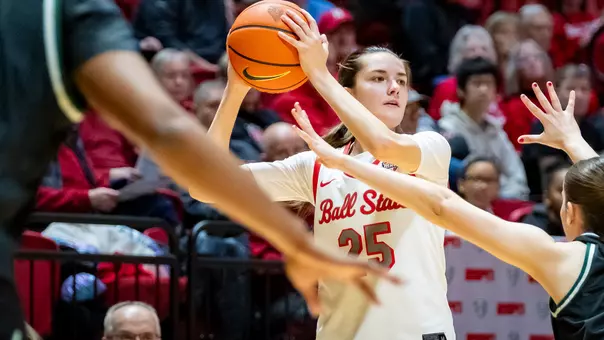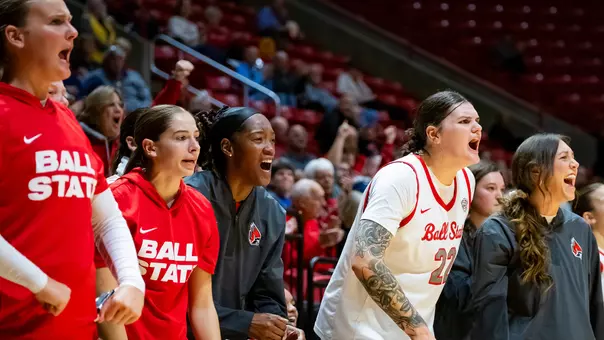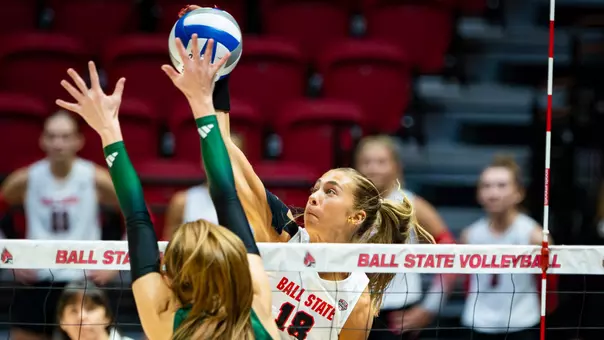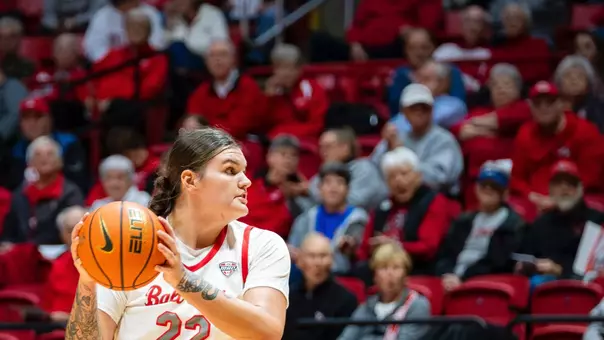Ball State University Athletics
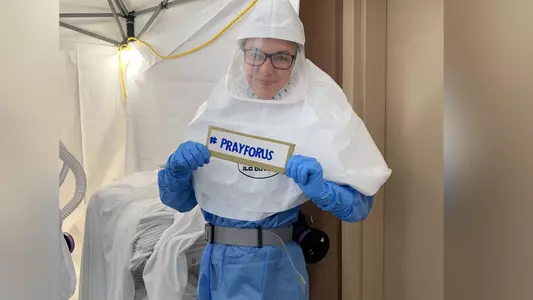
Photo by: Emily Dabkowski
Former Cardinals Working to Nurse America Through Pandemic
April 11, 2020 | General, Men's Golf, Softball, Women's Basketball, Women's Volleyball, Track & Field
Student-athletes among many serving on COVID-19 front line
Emily Dabkowski spent a softball career standing 70 feet away from a batter launching a ball at 70 miles an hour. Her reaction time at second base was less than one second.
But this is what scares the 26-year old.
"I constantly fear that I'm going to get [COVID-19]," said Dabkowski, now an ER nurse in Fresno, California. "I don't want to get anyone else sick. It would be the death of me if I knew that it was me that got anyone else sick."
That's why Dabkowski has traded in her regular scrubs for personal protective equipment (PPE) that looks less Florence Nightingale and more Bruce Willis in Armageddon. She wears a complete hood with a filter, making it extremely hard to hear.
During a time in which people across the world are sheltering in place, Dabkowski is among those who cannot. The former All-Mid-American Conference softball star is one of nearly four million nurses nationwide, many serving on the front lines in the battle against the COVID-19 virus.
"Going into a patient's room with respiratory symptoms or 'suspected COVID' always makes my heart drop," said ER nurse Carly Cappello, a Ball State volleyball defensive specialist from 2015 to 2018.
"This could be the patient that infects me, that makes me sick, that places me on a ventilator at the age of 23," Cappello said. "The 'what ifs' are terrifying to think about and you second guess everything. Did I do everything right? Did I take off my PPE correctly? Did I touch something on accident with my bare hand?"
"You can't really touch things less," said Regan Lewis, the four-time MAC high jump champion, now a Cincinnati-based surgical trauma nurse in the ICU.
That's why when her shift is over, Cappello washes and wipes everything from her stethoscope to every pen in her pocket. She stores her belongings in a biohazard bag and then a brown paper bag in her locker.
Cappello's PPE is not as space-agey as Dabkowski's but it does include the now famous N95 mask. She's issued one N95 daily and once it's removed the seal is never quite the same, so Cappello tries not to touch it over the duration of her shift despite headaches and her ears rubbing raw.
"I go straight to the shower when I get home from work," said Shelbie (Justice) Hoeing of her routine. Now an Indianapolis-based nurse, Hoeing graduated Ball State as the women's basketball team's all-time leader in games played. "One of my biggest fears is bringing [COVID-19] home to my little one and then my husband. That is something I hate to think about but it's running through my mind constantly."
Hoeing takes additional precautions when it comes to who interacts with her one-year-old daughter, who's often watched by Shelbie's grandparents.
"It was very upsetting to my grandparents at first, but I think they're starting to realize what this is actually turning into," Hoeing said. "To me it's just not worth the risk to expose that to them."
All of that taken into account, however, none of the former Cardinals are complaining.
"This is what I signed up for being a nurse," said Lewis. "I just wanted to have a career where I knew I'd be helping people."
"I love ER, and it's exactly what I wanted to do and I've always wanted to," Dabkowski said, while noting that her current situation is beyond her wildest imagination.
Traditional education prepares you for a crisis, but you're not exactly taught how to be a nurse during a global pandemic. The area you're assigned might even change on the fly. Lewis noted she can now be floated to a different unit in the hospital after passing her six-month mark on the job this week.
COVID-19 is a virus currently without specific treatment and more than 400,000 known cases in the United States resulting in more than 13,000 deaths.
"It's the fear of the unknown," Hoeing said. "We don't know what this quite is, how exactly to treat it."
At the same time, the virus is also one where, according to the Centers for Disease Control's website, "the immediate risk of becoming seriously ill from the virus … is thought to be low."
That's where things get tricky.
"The vast majority of people are asymptomatic or it's a very mild case. Oh, by the way in some people it can be very serious," said former Ball State golfer Alex Stinson, a family medicine physician assistant in Indianapolis. "That's the scary part of it, is that you don't know who's going to flip from mild to severe."
"Seeing it firsthand," Cappello said, "really opens your eyes … It's not just older people, it's younger people too who come in with an O2 saturation in the 70's, gasping for air, unable to speak. It's terrifying to see people doing okay, a little short of breath and having an O2 saturation in the low 90's and then suddenly it drops, and they have to be intubated at the age of 29."
Those experiences make staying in a positive mindset all the more important. On workdays Dabkowski goes for a run when she wakes up to help clear her head and "sweat it out." All the former Cardinals feel the outpouring of support from their communities.
"People donated flowers and food and it's just crazy all the messages you get," Hoeing said. "It's overwhelming the love and support that all these people are giving."
"So many people have reached out to me with a quick text asking if I'm okay or if I need anything," Cappello added. "Silly Facebook posts calling us superheroes for doing what we love everyday makes my heart happy."
"I have colleagues," Stinson said, "who are in the ER and who are working in critical care. Those are the ones being exposed to it all the time."
"Those are the real heroes."
But this is what scares the 26-year old.
"I constantly fear that I'm going to get [COVID-19]," said Dabkowski, now an ER nurse in Fresno, California. "I don't want to get anyone else sick. It would be the death of me if I knew that it was me that got anyone else sick."
That's why Dabkowski has traded in her regular scrubs for personal protective equipment (PPE) that looks less Florence Nightingale and more Bruce Willis in Armageddon. She wears a complete hood with a filter, making it extremely hard to hear.
During a time in which people across the world are sheltering in place, Dabkowski is among those who cannot. The former All-Mid-American Conference softball star is one of nearly four million nurses nationwide, many serving on the front lines in the battle against the COVID-19 virus.
"Going into a patient's room with respiratory symptoms or 'suspected COVID' always makes my heart drop," said ER nurse Carly Cappello, a Ball State volleyball defensive specialist from 2015 to 2018.
"This could be the patient that infects me, that makes me sick, that places me on a ventilator at the age of 23," Cappello said. "The 'what ifs' are terrifying to think about and you second guess everything. Did I do everything right? Did I take off my PPE correctly? Did I touch something on accident with my bare hand?"
"You can't really touch things less," said Regan Lewis, the four-time MAC high jump champion, now a Cincinnati-based surgical trauma nurse in the ICU.
That's why when her shift is over, Cappello washes and wipes everything from her stethoscope to every pen in her pocket. She stores her belongings in a biohazard bag and then a brown paper bag in her locker.
Cappello's PPE is not as space-agey as Dabkowski's but it does include the now famous N95 mask. She's issued one N95 daily and once it's removed the seal is never quite the same, so Cappello tries not to touch it over the duration of her shift despite headaches and her ears rubbing raw.
"I go straight to the shower when I get home from work," said Shelbie (Justice) Hoeing of her routine. Now an Indianapolis-based nurse, Hoeing graduated Ball State as the women's basketball team's all-time leader in games played. "One of my biggest fears is bringing [COVID-19] home to my little one and then my husband. That is something I hate to think about but it's running through my mind constantly."
Hoeing takes additional precautions when it comes to who interacts with her one-year-old daughter, who's often watched by Shelbie's grandparents.
"It was very upsetting to my grandparents at first, but I think they're starting to realize what this is actually turning into," Hoeing said. "To me it's just not worth the risk to expose that to them."
All of that taken into account, however, none of the former Cardinals are complaining.
"This is what I signed up for being a nurse," said Lewis. "I just wanted to have a career where I knew I'd be helping people."
"I love ER, and it's exactly what I wanted to do and I've always wanted to," Dabkowski said, while noting that her current situation is beyond her wildest imagination.
Traditional education prepares you for a crisis, but you're not exactly taught how to be a nurse during a global pandemic. The area you're assigned might even change on the fly. Lewis noted she can now be floated to a different unit in the hospital after passing her six-month mark on the job this week.
COVID-19 is a virus currently without specific treatment and more than 400,000 known cases in the United States resulting in more than 13,000 deaths.
"It's the fear of the unknown," Hoeing said. "We don't know what this quite is, how exactly to treat it."
At the same time, the virus is also one where, according to the Centers for Disease Control's website, "the immediate risk of becoming seriously ill from the virus … is thought to be low."
That's where things get tricky.
"The vast majority of people are asymptomatic or it's a very mild case. Oh, by the way in some people it can be very serious," said former Ball State golfer Alex Stinson, a family medicine physician assistant in Indianapolis. "That's the scary part of it, is that you don't know who's going to flip from mild to severe."
"Seeing it firsthand," Cappello said, "really opens your eyes … It's not just older people, it's younger people too who come in with an O2 saturation in the 70's, gasping for air, unable to speak. It's terrifying to see people doing okay, a little short of breath and having an O2 saturation in the low 90's and then suddenly it drops, and they have to be intubated at the age of 29."
Those experiences make staying in a positive mindset all the more important. On workdays Dabkowski goes for a run when she wakes up to help clear her head and "sweat it out." All the former Cardinals feel the outpouring of support from their communities.
"People donated flowers and food and it's just crazy all the messages you get," Hoeing said. "It's overwhelming the love and support that all these people are giving."
"So many people have reached out to me with a quick text asking if I'm okay or if I need anything," Cappello added. "Silly Facebook posts calling us superheroes for doing what we love everyday makes my heart happy."
"I have colleagues," Stinson said, "who are in the ER and who are working in critical care. Those are the ones being exposed to it all the time."
"Those are the real heroes."
Players Mentioned
This Week in Ball State Sports Podcast // Guests: Mike Iandolo and Jeff Mitchell
Thursday, December 18
Heart of the Cardinal Podcast // Guests: Mike Fleck and Alauna Simms
Monday, December 15
'Twas The Week Before #MACtion
Saturday, December 13
Heart of the Cardinal Podcast // Alauna Simms on Ball State Journey
Saturday, December 13

